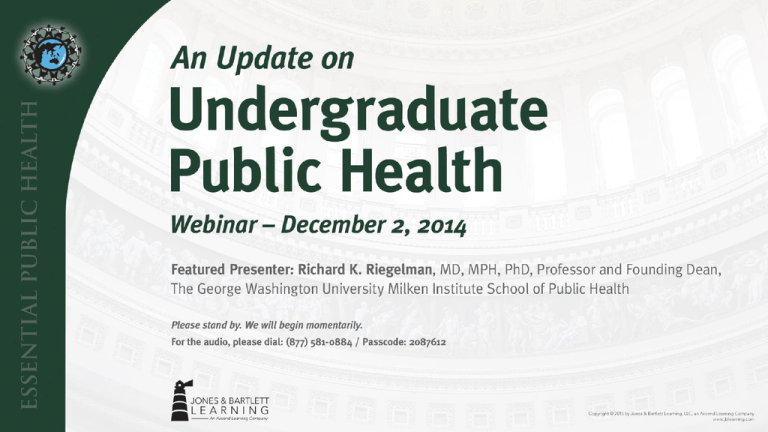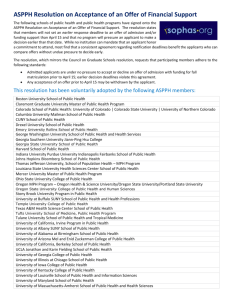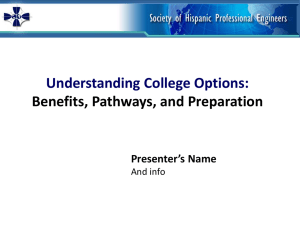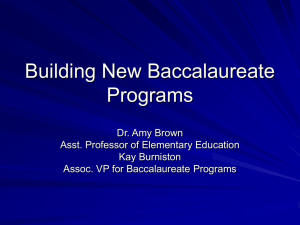Growth in Undergrad Public Health
advertisement

RICHARD K. RIEGELMAN, MD, MPH, PhD Professor and Founding Dean, The George Washington University Milken Institute School of Public Health Growth in Undergrad Public Health • Exponential growth in majors - Department of Education indicates over 6,000 bachelor’s degrees in 2012 with evidence of continuing rapid growth • At many colleges, it is among the top 10 majors • Data does not include large number of minors Framing the Future Task Force • Convened by ASPPH to look at the second hundred years of education for public health • Developed “Critical Component Elements” for all generalist and specialized bachelor’s degree in public health and related fields • “Continuum of public health education” is organizing theme – from community colleges to doctoral education • Undergraduate public health now widely accepted by Schools and Programs and they are encouraging the growth of “standalone” public health majors as well as minors Products of “Framing the Future” • Critical Component Elements of an Undergraduate Major in Public Health • Revision of MPH degree-responsive to growth of undergraduate public health education • Community Colleges and Public Health report Critical Component Elements Content Areas: 1. Science Skill Areas: 1. Communications 2. Social and Behavioral Sciences 2. Information Literacy 3. Math/Quantitative Reasoning 4. Humanities and Fine Arts Core Public Health A. Overview of Public Health F. Project Management B. Role and Importance of Data in Public Health G. C. Identifying and Addressing Community Health Challenges Overview of Health Care, Health Care Systems, and Structures H. Health Policy, Law, and Economics I. Health Communication D. E. Human Health Determinants of Health Capstone and Field Experiences Synthesis and experiential learning are strongly encouraged as part of undergraduate public health • Capstone • Field Experiences CEPH • Voluntary accreditation of “standalone” bachelor’s degree programs not minors • Incorporating Critical Component Elements into accreditation criteria • Accrediting undergraduate majors in Programs and Schools as part of overall accreditation Revision of MPH • Core built on Critical Component Elements • Specialization expected but greater flexibility for Schools and Programs to design • Mechanism(s) for articulation of bachelor’s with MPH under discussion Community Colleges & Public Health Project • Sponsored by ASPPH + League for Innovation in the Community College, which represents over 800 of the 1100 community colleges • Prototype Curricular Models developed: – Public Health: Generalist & Specializations - Associate degree for transfer to bachelor’s degree including generalist, health education, environmental health, health administration – Health Navigator programs - Certificates, Applied Associate degrees, plus Associate degrees for transfer Prototype Curricular Models • Provide recommended courses and content outlines for each recommended course • Developed in collaboration with academic organizations SOPHE, AUPHA, AEHAP plus public health practice organizations ASTHO and NACCHO • Full report including content outlines available at http://www.league.org/ccph/ Community Colleges & Public Health Next Steps League for Innovation in the Community Colleges, in collaboration with public health organizations, will: • Disseminate the report to all community colleges • Put out “call for planning” in early 2015 • Sponsor series of webinars with collaborating organizations to provide information for community colleges • Develop network to assist community college in developing programs that can articulate with bachelor’s degree programs Association of American Colleges and Universities (AAC&U) • Educated Citizen and Public Health including sessions at national meetings • Website and list serve: http://www.aacu.org/public_health/index.cfm • Scientific Thinking and Integrative Reasoning Skills (STIRS) project: http://www.aacu.org/stirs/index.cfm Association of Schools and Programs of Public Health (ASPPH) • 4th Annual Undergraduate Public Health Summit—nearly 200 faculty attended in November 2014. Plans are being developed for 5th Annual Summit • ASPPH first standalone annual meeting will take place on March 22-24, 2015 in Washington D.C.—Theme: Framing the Future • For more information on ASPPH see http://www.aspph.org/ Essential Public Health Series • Introductory series—including texts for MPH core, majors, minors, and community colleges • Increasing use of technology including student and faculty websites, interactive eBooks, and comprehensive Navigate 2 products Recent Books and Products • Essentials of Public Health Ethics • Essentials of Health Behavior, Second Edition • Public Health 101: Healthy People—Healthy Populations, Second Edition Includes Navigate 2 Advantage Access • Essentials of Health Information Systems and Technology • Essentials of Program Planning and Evaluation for Public Health Essential Public Health series and Critical Component Elements I. BACKGROUND DOMAINS A. Content Areas 1. Science 2. Social and Behavioral Sciences 3. Math/Quantitative Reasoning: Essentials of Biostatistics for Public Health 4. Humanities/Fine Arts Essential Public Health series and Critical Component Elements (cont.) II. PUBLIC HEALTH DOMAINS A. Overview of Public Health 1. Public Health 101 2. Global Health 101 B. Role and Importance of Data in Public Health 1. Epidemiology 101 2. Essentials of Health Information Systems and Technology Essential Public Health series and Critical Component Elements (cont.) C. Identifying and Addressing Population Health Challenges 1. Public Health 101 2. Global Health 101 D. Human Health 1. Essentials of Public Health Biology Essential Public Health series and Critical Component Elements (cont.) E. F. Determinants of Health 1. Essentials of Health, Culture, and Diversity 2. Global Health 101 3. Public Health 101 Project Implementation 1. Essentials of Planning and Evaluation for Public Health 2. Essentials of Management and Leadership in Public Health Essential Public Health series and Critical Component Elements (cont.) III. CULMULATIVE EXPERIENCE and FIELD EXPOSURE Students should have opportunities to integrate, apply, and synthesize knowledge through cumulative and experiential activities that include: A. B. Cumulative Experience 1. Case Studies in Public Health: Putting Public Health into Practice 2. Case Studies in Global Health: Millions Saved Field Exposure 1. XXXXX *Note the Association of Schools and Programs of Public Health does not recommend textbooks Questions? The Essential Public Health Series Complimentary review copies available for qualified instructors. Additional Questions? Richard Riegelman, MD, MPH, PhD Sophie Fleck Teague The George Washington University Milken Institute School of Public Health rriegelman@gmail.com Senior Marketing Manager, Public Health Jones & Bartlett Learning steague@jblearning.com Learn more at www.essentialpublichealth.com











